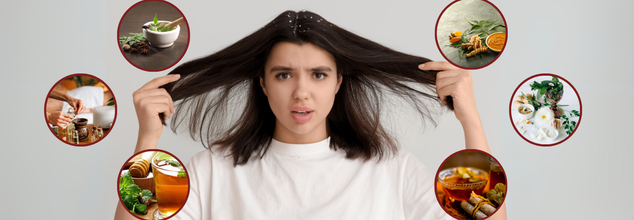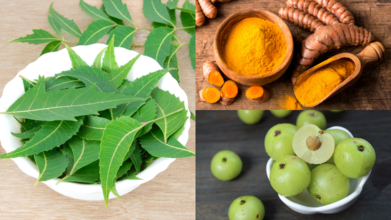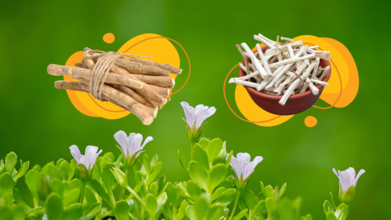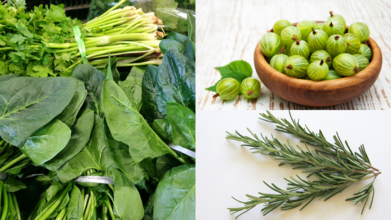- Health Conditions A-Z
- Health & Wellness
- Nutrition
- Fitness
- Health News
- Ayurveda
- Videos
- Medicine A-Z
- Parenting
- Web Stories
Can You Get Rid Of Dandruff Naturally? Ayurvedic Remedies To Boost Scalp Health

(Credit-Canva)
Dandruff may get worse with winters, but for many it is an all year-round issue. It makes your scalp feel itchy, flaky as well as irritating. While one may think that this isn’t a big deal as it is just in our scalp, often they can create a flaky mess, showing up on clothes and may cause people to feel self-conscious. There are many ways to tackle this issue, there are dedicated shampoos, conditioners and treatments that can help you get rid of dandruff. However to do it properly, one must understand what dandruff actually is and the causes of it as well.
What is Dandruff and What Causes It?
According to Mayo clinic Dandruff happens when small pieces of dry skin flake off your scalp, often because your scalp is producing too much oil. As old skin cells die and new ones replace them, the old cells are pushed to the surface and flake off. This can make your scalp feel dry, rough, itchy, and sometimes even red. When dandruff is severe, skin cells might multiply faster, leading to more noticeable flakes and constant itching.
Several things can contribute to dandruff. Not washing your hair often enough can make it worse because oil, dirt, dead skin cells, and product buildup accumulate on your scalp. Also, your scalp can get irritated by chemicals in hair care products, causing an itchy rash. Dry skin, especially in winter when the air is less humid, can also lead to dandruff with smaller, less oily flakes. Hormones can also play a role, as they can increase oil production on the scalp, making dandruff more common in some people.
Here Are Some Ayurvedic Tips That Can Help
Bhringraj
This herb, often called the 'King of Herbs', is traditionally used to promote strong and healthy hair growth. It is also thought to help prevent hair from turning gray too early, while its properties can soothe an irritated scalp and reduce dandruff flakes by improving circulation.
Shikakai
Revered as the 'Fruit of the Hair', Shikakai is a natural cleanser that has been used for centuries. It gently removes dirt and excess oil from the scalp without stripping away its natural moisture, which can help manage dandruff and promote a healthier scalp environment for hair growth.
Neem
Widely recognized as a potent healer in traditional practices, Neem possesses strong antifungal properties that can effectively combat the fungi often associated with dandruff. It is also known for its ability to calm inflammation and reduce the persistent itching and irritation of the scalp caused by dandruff.
Tea Tree
The oil extracted from the Tea Tree is well-known for its powerful antimicrobial properties, making it a valuable ingredient in addressing dandruff. It can help to fight the microorganisms that contribute to a flaky scalp and reduce the overall severity of dandruff symptoms like itching and visible flakes.
Here are some other home remedies you can try with easily available household items and herbs.
- Soak Neem leaves overnight, make a paste with yogurt, apply for 30 mins.
- Mix egg whites with lemon juice as a hair mask.
- Gently massage baking soda into wet hair as a scrub.
- Combine Amla powder with Tulsi leaf paste, apply to scalp.
- Soak and grind Fenugreek seeds with lemon juice, apply as a paste.
- Mix Apple Cider Vinegar with water, apply to scalp.
- Soak Reetha, Shikakai, and Amla overnight, boil, strain, and use as shampoo.
- Pound Garlic with water, honey, and ginger powder, apply to scalp.
- Mix Tea Tree Oil with coconut oil, apply to scalp.
Clear Skin in the Monsoon: 5 Ayurvedic Superfoods to Beat Breakouts from Within

Credits: Canva
The monsoon brings with it that dreamy smell of rain-soaked earth, endless chai cravings, and… surprise guests in the form of clogged pores, excess oil, and stubborn breakouts. Humidity and temperature swings are basically a free buffet for acne-causing bacteria. Most of us immediately reach for new face washes or a stronger toner, but according to Ayurveda, you might be missing the most important step, fixing what is on your plate.
“Seasonal changes can aggravate doshas, especially Vata and Pitta during the monsoon, leading to inflammation, acne, and rashes,” says Ayurveda practitioner Dr Madhumitha Krishnan. “Along with skincare, it is essential to bring balance through diet by choosing foods that are sweet in nature and slightly oily, which soothe the body and keep skin issues at bay.”
Here are her top five Ayurvedic superfoods that do more than taste good; they keep your skin glowing even when the weather is a mess.
1. Almonds
If almonds could talk, they would probably brag about how well they can multitask. Primarily sweet in taste and slightly oily in nature, they help balance both Vata and Pitta doshas, making them perfect rainy-season companions. Ancient Ayurveda, Siddha, and Unani texts all sing praises for almonds’ skin-enhancing abilities.
“They nourish the skin from within and maintain dosha balance during humid months,” explains Dr Krishnan. The trick? Soak them overnight. This makes them easier to digest and allows their nutrients to work deeper magic on your skin, keeping it supple and radiant.
2. Turmeric
This golden spice is not just for your grandma’s curries; it is basically edible skincare. Known for its antibacterial and anti-inflammatory powers, turmeric supports digestion (which in Ayurveda is key to skin health) and balances Vata dosha.
By slipping turmeric into your daily cooking, you help reduce the inflammation that often fuels acne. “It purifies the blood, wards off infections, and leaves the skin healthier from the inside out,” says Dr Krishnan. Think of it as the quiet hero who works behind the scenes, preventing those surprise breakouts.
3. Amla
Indian gooseberry, or amla, might be tiny, but it is a tridosha balancer with big skin benefits. It boosts immunity, slows down skin ageing, and helps detoxify the body, all of which lower your risk of monsoon breakouts.
“Amla is one of Ayurveda’s most powerful rejuvenators,” says Dr Krishnan. “Its detoxifying action removes impurities that would otherwise show up on the skin.” Whether you have it as juice, powder, or simply raw with a pinch of salt, your skin will thank you.
4. Neem
If breakouts are the troublemakers at the club, neem is the bouncer at the door. Its antibacterial, antifungal, and blood-purifying properties make it one of the most reliable Ayurvedic remedies for clear skin.
“Neem works by flushing toxins from the bloodstream,” explains Dr Krishnan. Neem juice might not win any taste awards, but it’s a small price to pay for skin that stays calm through the muggy season.
5. Garlic
Garlic might not win you any points in the “fresh breath” department, but it is a skin-saving legend. With its Vata-balancing qualities, it fights inflammation from within and supports overall detox.
Dr Krishnan says, “Many wellness experts recommend eating one raw clove of garlic on an empty stomach; it is a potent way to keep skin and overall health in check.” This practice has even gone viral on social media, proving that sometimes ancient remedies can become modern trends.
If you want to win the clear-skin game this monsoon, do not just attack the surface problem. As Ayurveda reminds us, beauty begins from within, quite literally. By adding almonds, turmeric, amla, neem, and garlic to your diet, you’re not just treating your taste buds; you are giving your skin an internal spa treatment.
Ashwagandha, Brahmi, Shatavari: Ayurvedic Trinity Every Woman In Her 20s Must Know

Credits: Health and me
Your 20s are usually described as the age of opportunity with new careers, new friendships, and the thrill of self-sufficiency. But behind that shiny veneer is a harsh reality most women manage to endure- mental pressure, unstable hormones, and the ever-present pressure to perform and present well. Throw in social media comparisons, irregular sleep, take-out lunches, and the occasional missed workout, and the body begins to trade on.
For most women, these are the years when they experience menstrual disturbances, mood swings, or initial signs of diseases like PCOD, thyroid disorders, or chronic fatigue. Conventional medicine prescribes treatments, but these are usually aimed at symptoms, not causes. Ayurveda, the traditional Indian system of medicine, addresses in a different manner - the balance of mind, body, and spirit before disease arises.
Three herbs, more than any others, have been proven over time in this tradition: Ashwagandha, Brahmi, and Shatavari. Used properly, this combination can assist women through the physical and emotional rollercoaster of their 20s with greater energy, clarity, and strength.
Brahmi for Stress and Mental Clarity
For most women in their 20s, stress is an inevitable friend. It tends to manifest as racing thoughts at night, difficulty concentrating throughout the day, or a nagging sensation of being "on edge." Brahmi, a traditional Ayurvedic adaptogenic herb, has been employed for centuries to calm the nervous system and clarify the mind.
Dr. Sane elucidates, "Brahmi balances the nervous system, calms anxiety, and enhances mental function. Its tranquility effect not only relieves tension but also aids in memory and concentration.
The science is aligned with tradition. Current research indicates Brahmi promotes neurotransmitter action, helping to improve mood management. For a woman balancing deadlines, social commitments, and individual aspirations, this translates into fewer mental whiplashes and smoother emotional steadiness. Ongoing use can make a subtle yet significant difference—converting fragmented attention into sustained focus and shattering mental fatigue with lucidity.
In contrast to speedy fixes such as caffeine, which provide temporary surges of energy with subsequent crashes, Brahmi's effects escalate over time. It doesn't render you drowsy it calms the mental static so you can think clearly about what's important without being wired or depleted.
Ashwagandha for Strength, Hormones, and Fertility
If Brahmi soothes the mind, Ashwagandha energizes the body. Dubbed the "king of herbs," Ashwagandha is renowned for its energizing properties. Its adaptogenic properties make it assist the body in adapting to physical and emotional stress.
Ashwagandha tones muscles, lowers fatigue, and increases energy levels," states Dr. Sane. "It's especially needed by women in their 20s, who tend to overlook their physical health in the process of keeping up with their hectic schedules.
But Ashwagandha's utility doesn't stop there. It's seriously associated with reproductive health, not just for stamina, but also for nourishing the ovum and hormonal balance. In women who have irregular cycles, menstrual cramps, or initial signs of hormonal imbalance, Ashwagandha provides a natural means of rebalancing. Science also suggests its value in maintaining healthy fertility, and thus it makes a great long-term reproductive health ally.
Shatavari for Hormonal and Vascular Health
Where Ashwagandha brings strength and Brahmi brings tranquility, Shatavari sustains. This herb is commonly referred to as the "queen of herbs" of female health. It's especially helpful for the reproductive system, assisting in regular menstrual cycles and relieving cramping periods.
"Shatavari is a hormone balancer and maintains healthy blood vessels, de-inflammating wherever stress and hormonal shifts usually inflame," Dr. Sane adds. Its rejuvenating action also includes immune system support so that the body's defense mechanisms are up and functioning.
The advantages of Shatavari radiate outward. Improved hormonal well-being tends to mean healthier-looking skin, steadier moods, and greater energy—effects of particular significance during the socially and professionally demanding 20s.
Why This Ayurvedic Trio is Best Combined?
Individually, each of these herbs is remarkable. Dr. Sane advises starting slowly: "A daily supplement, herbal tea, or even powdered form added to warm milk or smoothies can make a difference over time." Combined, they create a synergistic system of support:
Brahmi soothes the mind and increases focus, calming stress-related hormonal imbalances.
Ashwagandha builds the body, stabilizes stress response, and enhances reproductive energy.
Shatavari supports hormonal well-being, guards the vascular system, and preserves reproductive vigor.
This multi-faceted strategy tackles the entire range of females' troubles in their 20s — from the mental burden to physical endurance to long-term hormonal equilibrium.
Safe Use and Real Tips
Though these herbs are natural, they're not a one-size-fits-all remedy. Dosage and preparation come into play. In Ayurveda, herbs are frequently ingested as a powder with warm milk or water, or as capsules for convenience. General advice:
- Use high-quality, certified herbal supplements to ensure purity.
- If pregnant, breastfeeding, or on medication, seek guidance from a qualified healthcare practitioner before beginning.
- Herbs are most effective when used with balanced diet, regular exercise, and proper rest.
Ayurveda understands herbs in terms of a larger context. For women aged 20, combining these remedies with conscious eating, daily yoga or weight training, and electronic downtime can enhance effects.
Easy habits such as beginning the day with a quick meditation, consuming fresh seasonal produce, and maintaining an even sleep schedule can increase the impact of Brahmi, Ashwagandha, and Shatavari.
Your 20s aren't merely about bracing yourself against deadlines or pursuing milestones—they're about developing resilience, both physically and emotionally. "Consider this decade as your investing years for your future health," Dr. Sane suggests. "What you do now will determine how you feel in your 30s, 40s, and so on."
They're not wonder pills, but resources to assist you in getting through the demands of this decade without giving up your well-being. Amidst a society that celebrates hyperwork and perfectionism, electing to look after your mind and body is a gentle form of rebellion — and an investment in your healthiest future.
Dr Rohit Sane is ayurvedic doctor and CEO & MD at Madhavbaug, India
Eat Your Way to Lush Locks: 4 Ayurvedic Food Groups That Boost Hair Growth

If your hairbrush has been collecting more strands than you would like to admit, your plate might be the problem. According to Ayurvedic health coach Dimple Jangda, the secret to thicker, shinier, stronger locks doesn’t lie in a pricey serum but in your kitchen. “Four food groups… prevent hair loss and promote hair growth. You must definitely have this at home,” she says. And she’s not talking about exotic, hard-to-pronounce superfoods; these are humble, accessible ingredients that can transform your hair from limp to lush.
1. Greens
Dimple champions greens like spinach and moringa as hair saviours. Spinach is more than a side salad staple — it’s loaded with iron, folate, vitamin A and vitamin C. Moringa, often called the ‘drumstick tree’, is an Ayurvedic darling packed with vitamins A, B, and E, zinc and iron.
“Both of them help in stimulating hair growth,” says Dimple, explaining that they also boost the production of hair sebum, the scalp’s natural oil that keeps hair hydrated and protected. In other words, leafy greens are basically your hair’s in-house moisturiser.
Tip: Add spinach to your morning smoothie or sauté moringa leaves with a dash of ghee for a side dish that doubles as a beauty treatment.
2. Seeds
Next on Dimple’s list are seeds. Pumpkin seeds deliver zinc and other fatty acids, while flax seeds are famous for their omega-3 content. They help in improving the hair strength and reducing hair loss and hair breakage, according to Dimple.
Sprinkle a spoonful of flax seeds over yoghurt, blend them into your smoothie, or toss pumpkin seeds into your salad for an easy hair boost.
3. Vitamin C-Rich Foods
When Dimple talks about vitamin C, she’s not thinking about orange juice alone. She recommends sweet peppers and amla (Indian gooseberry) as top picks. Both are rich in vitamin C, which she says helps in reducing oxidative stress in your body, stimulating hair growth.
Oxidative stress is like rust for your cells and yes, that includes your hair follicles. Keeping it at bay ensures healthier growth and less shedding.
Tip: Snack on sweet pepper slices with hummus or chew on fresh amla if you can handle its tangy punch. You could also sip amla juice in the morning for a daily hair tonic.
4. Rosemary
Finally, Dimple calls rosemary the most powerful of the four. It contains rosmarinic acid, which she says can be consumed or applied. “You can make a rosemary tea and drink every day or you can make a concoction of rosemary, castor and coconut oil, apply it on your scalp and rinse it off after an hour,” she explains. This helps stimulate new hair growth and may even prevent baldness.
Making rosemary tea feels like a mini self-care ritual. The steam alone is soothing. As for the oil blend, it’s basically a spa treatment for your scalp.
Beyond the Plate
While these four food groups can work wonders from the inside, Dimple reminds us that holistic care makes the magic happen. Staying hydrated, avoiding excess caffeine, and massaging your scalp with oils infused with bhringraj, brahmi or coconut can further boost blood circulation and strengthen follicles.
Herbal masks made with hibiscus, fenugreek and shikakai soothe the scalp and encourage fresh growth, while daily stress-relief practices like pranayama, gentle yoga and mindful eating can help you keep your mane in peak condition.
© 2024 Bennett, Coleman & Company Limited

